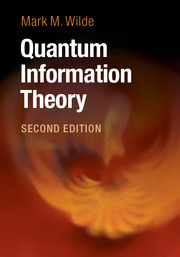Book contents
- Frontmatter
- Contents
- Preface to the Second Edition
- Preface to the First Edition
- How To Use This Book
- Part I Introduction
- Part II The Quantum Theory
- Part III Unit Quantum Protocols
- Part IV Tools of Quantum Shannon Theory
- 9 Distance Measures
- 10 Classical Information and Entropy
- 11 Quantum Information and Entropy
- 12 Quantum Entropy Inequalities and Recoverability
- 13 The Information of Quantum Channels
- 14 Classical Typicality
- 15 Quantum Typicality
- 16 The Packing Lemma
- 17 The Covering Lemma
- Part V Noiseless Quantum Shannon Theory
- Part VI Noisy Quantum Shannon Theory
- Appendix A Supplementary Results
- Appendix B Unique Linear Extension of a Quantum Physical Evolution
- References
- Index
17 - The Covering Lemma
from Part IV - Tools of Quantum Shannon Theory
Published online by Cambridge University Press: 16 February 2017
- Frontmatter
- Contents
- Preface to the Second Edition
- Preface to the First Edition
- How To Use This Book
- Part I Introduction
- Part II The Quantum Theory
- Part III Unit Quantum Protocols
- Part IV Tools of Quantum Shannon Theory
- 9 Distance Measures
- 10 Classical Information and Entropy
- 11 Quantum Information and Entropy
- 12 Quantum Entropy Inequalities and Recoverability
- 13 The Information of Quantum Channels
- 14 Classical Typicality
- 15 Quantum Typicality
- 16 The Packing Lemma
- 17 The Covering Lemma
- Part V Noiseless Quantum Shannon Theory
- Part VI Noisy Quantum Shannon Theory
- Appendix A Supplementary Results
- Appendix B Unique Linear Extension of a Quantum Physical Evolution
- References
- Index
Summary
The goal of the covering lemma is perhaps opposite to that of the packing lemma because it applies to a setting in which one party wishes to make messages indistinguishable to another party (instead of trying to make them distinguishable, as in the packing lemma of the previous chapter). That is, the covering lemma is helpful when one party is trying to simulate a noisy channel to another party, rather than trying to simulate a noiseless channel. One party can accomplish this task by randomly “covering” the Hilbert space of the other party (this viewpoint gives the covering lemma its name).
One can certainly simulate noise by choosing a quantum state uniformly at random from a large set of quantum states and passing along the chosen quantum state to a third party without indicating which state was chosen. But the problem with this approach is that it could potentially be expensive if the set from which we choose a random state is large, and we would really like to use as few resources as possible in order to simulate noise. That is, we would like the set from which we choose a quantum state uniformly at random to be as small as possible when simulating noise. The covering lemma is similar to the packing lemma in the sense that its conditions for application are general (involving bounds on projectors and an ensemble), and it gives an effective scheme for simulating noise when we apply it in an i.i.d. setting.
One application of the covering lemma in quantum Shannon theory is in the construction of a code for transmitting private classical information over a quantum channel (discussed in Chapter 23). The method of proof for private classical transmission involves a clever combination of packing messages so that Bob can distinguish them, while covering Eve's space in such a way that Eve cannot distinguish the messages intended for Bob. A few other applications of the covering lemma are in secret key distillation, determining the amount of noise needed to destroy correlations in a bipartite state, and compressing the outcomes of an i.i.d. measurement on an i.i.d. quantum state.
Information
- Type
- Chapter
- Information
- Quantum Information Theory , pp. 486 - 502Publisher: Cambridge University PressPrint publication year: 2017
